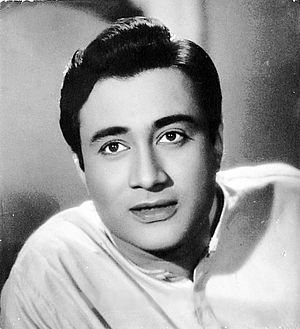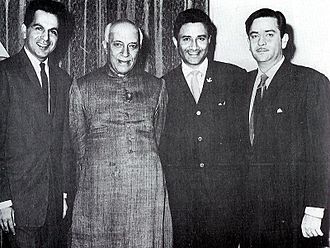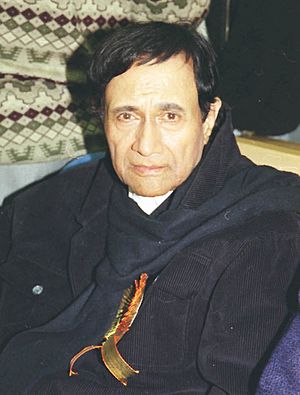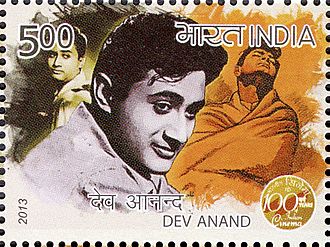Dev Anand facts for kids
Quick facts for kids
Dev Anand
|
|
|---|---|

Dev Anand, c. 1954
|
|
| Born |
Dharamdev Pishorimal Anand
26 September 1923 |
| Died | 3 December 2011 (aged 88) |
| Other names | Dev Sahab, Evergreen star |
| Alma mater | Government College, Lahore (BA) |
| Occupation |
|
| Years active | 1946–2011 |
| Spouse(s) |
Kalpana Kartik
(m. 1954) |
| Children | 2; including Suneil Anand |
| Relatives | See Anand-Sahni family |
| Awards |
|
| Signature | |
 |
|
Dharamdev Pishorimal Anand (born 26 September 1923 – died 3 December 2011), known as Dev Anand, was a famous Indian actor, writer, director, and producer. He worked in Hindi cinema for over sixty years. He was one of the most successful actors in Indian cinema. People often called him part of the "Trinity – The Golden Trio" along with Raj Kapoor and Dilip Kumar, who were also very popular actors of his time.
The Government of India honored him with the Padma Bhushan award in 2001 and the Dadasaheb Phalke Award in 2002. These are two of India's highest honors for people who have contributed a lot to Indian cinema. He also won the Filmfare Award for Best Actor twice and a special Filmfare Lifetime Achievement Award in 1993 for his amazing career.
Dev Anand's films often explored his views on the world and talked about important social topics. He had a unique acting style that many other actors tried to copy.
Contents
Early Life and Education
Dev Anand was born Dharamdev Pishorimal Anand on 26 September 1923. His birthplace was in a region called Shakargarh, which was then part of British India (now in Pakistan). His father was a lawyer. Dev was one of four sons. His older brothers were Manmohan Anand and Chetan Anand, and his younger brother was Vijay Anand. His sister, Sheel Kanta Kapur, is the mother of film director Shekhar Kapur.
Dev Anand went to school in Dalhousie and Dharamshala. He later earned a Bachelor of Arts (BA) degree in English Literature from the Government College, Lahore in British India. In 1949, he and his elder brother Chetan Anand started their own film company called Navketan Films.
Career Beginnings
After finishing his degree, Dev Anand moved to Bombay (now Mumbai) in the early 1940s. He started his career working in a military office and then as a clerk. However, he really wanted to become an actor. He was inspired by famous actors like Ashok Kumar.
Dev Anand got his first big acting role in the film Hum Ek Hain (1946). This movie was about Hindu-Muslim unity. While filming, he became good friends with another actor, Guru Dutt. They made a promise: if one of them became successful, they would help the other. This promise led to many great films later on.
Early Success and Film Partnerships
In the late 1940s, Dev Anand starred in several films with the singer-actress Suraiya. They made seven successful movies together, including Vidya (1948) and Jeet (1949). Suraiya was a bigger star at the time. Their partnership was very popular, but Suraiya's family did not approve of their close friendship, so they stopped working together.
In 1948, Dev Anand got another big break from actor Ashok Kumar, who chose him for the film Ziddi. This movie was a huge hit. After its success, Dev Anand decided to start producing his own films. In 1949, he launched his company, Navketan Films, which has produced many movies over the years.
Dev Anand chose his friend Guru Dutt to direct his crime thriller film, Baazi (1951). This film was a big success and helped create a new style of urban crime movies in Bollywood. In Baazi, Dev Anand starred with Kalpana Kartik, who later became his wife. They made several successful films together, like Taxi Driver (1954). They got married in 1954 and had two children, Suneil and Devina. After marriage, Kalpana Kartik stopped acting.
Dev Anand became known for his fast way of delivering dialogues and nodding his head while speaking. This style became his trademark in films like Jaal (1952) and C.I.D. (1956). His films in the 1950s were often mysteries, romantic comedies, or movies with important social messages. He won his first Filmfare Award for Best Actor for the film Kala Pani (1958).
Romantic Hero and Director in the 1960s and 1970s
In the 1960s, Dev Anand became known as a romantic hero. He starred in popular films like Manzil and Tere Ghar Ke Samne with Nutan, and Jab Pyar Kisi Se Hota Hai. One of his most famous films from this period was Hum Dono (1961), where he played a double role. This film was also a big hit.
His first color film was Guide (1965), starring Waheeda Rehman. This movie was based on a famous novel by R. K. Narayan. Dev Anand himself helped make the film happen. Guide, directed by his younger brother Vijay Anand, was highly praised and was even considered for an Academy Award for Best Foreign Language Film. Dev Anand gave a powerful performance as Raju, a guide who helps a woman find her freedom.
He worked with his brother Vijay Anand again on the successful thriller Jewel Thief (1967) and Johny Mera Naam (1970), which was a huge hit and helped make Hema Malini a big star.
In the 1970s, Dev Anand started directing films. His first movie as a director, Prem Pujari, was not a big success at first but later became a favorite for many. He found success with his 1971 film Hare Rama Hare Krishna, which talked about the hippie culture. This film introduced Zeenat Aman, who became very famous overnight. Dev Anand also starred in Tere Mere Sapne (1971), which was also a success.
Even as he got older, Dev Anand continued to star in many successful films in the 1970s, like Banarasi Babu (1973), Heera Panna (1973), and Warrant (1975). He was known as the "Evergreen Star" because he continued to act with young heroines and make popular movies even in his fifties. His film Des Pardes (1978) was a big hit and introduced actress Tina Munim.
Political Involvement and Later Career
Dev Anand was also involved in politics. He spoke out against the "Emergency" period in India in the late 1970s, which was a time when the government had special powers. He even started a political party called the "National Party of India," but he later closed it down.
His success continued into the 1980s with films like Lootmaar and Swami Dada (1982). He tried to launch his son, Suneil Anand, as an actor in the film Anand Aur Anand (1984), but the movie was not successful.
Despite this, Dev Anand continued to act and direct. His films Hum Naujawan (1985) and Lashkar (1989) were successful. He even acted with younger stars like Aamir Khan in Awwal Number (1990). His last film, Chargesheet, was released in 2011, shortly before his death.
Dev Anand appeared in 114 Hindi films and two English films, including the English version of Guide. He holds the record for the second most solo lead roles in Hindi films, with 92.
Recognition and Legacy

Dev Anand was often compared to the famous Hollywood actor Gregory Peck. However, Dev Anand always said he wanted to be known as himself, Dev Anand, not as someone else. He met Gregory Peck several times and they had friendly conversations.
Dev Anand directed 19 films and produced 35 films. Many of his films were successful. He also wrote stories for 13 of his movies. Critics often said his films were ahead of their time. His movies are also famous for their wonderful songs. He worked closely with many great music composers and singers, like Sachin Dev Burman, Rahul Dev Burman, and Kishore Kumar, to create memorable music.
In 2007, Dev Anand released his autobiography (a book about his own life) called Romancing with Life. In 2011, his 1961 film Hum Dono was made into a color film and re-released.
Dev Anand is also known for discovering and helping many new talents in the film industry. He gave actors like Jackie Shroff, Tabu, Zeenat Aman, and Tina Munim their first big breaks. He also encouraged music composers like Rajesh Roshan. Many famous people in Indian cinema, like Guru Dutt, Waheeda Rehman, and Shekhar Kapur, started their careers under Dev Anand's film company, Navketan Films.
Personal Life
Dev Anand married Kalpana Kartik (whose real name was Mona Singha) in 1954. She was also a Bollywood actress. They had a quiet wedding during the filming of their movie Taxi Driver. They had a son named Suneil and a daughter named Devina.
Death
Dev Anand passed away in London on 3 December 2011, at the age of 88, due to a heart attack. His death happened just two months after his last film, Chargesheet, was released. His funeral service was held in London, and his ashes were later brought back to India to be immersed in the Godavari River.
Awards and Honours

The Government of India honored Dev Anand with the Padma Bhushan in 2001 and the Dadasaheb Phalke Award in 2002. These are very high awards for his contributions to Indian cinema. He won the Filmfare Award for Best Actor for his roles in Kala Pani and Guide.
Major Awards
- 2001 – Padma Bhushan (India's third highest civilian award)
- 1965 – National Film Award for Best Feature Film in Hindi for Guide
- 2002 – Dadasaheb Phalke Award (India's highest award for cinema)
- 1959 – Best Actor for Kala Pani
- 1967 – Best Actor for Guide
- 1967 – Best Film for Guide
- 1993 – Lifetime Achievement Award
Other Honours
Dev Anand received many other awards and honors throughout his career, including:
- 1995 – Screen Lifetime Achievement Award
- 2000 – "Star of the Millennium" Award in Silicon Valley, California.
- 2001 – "Evergreen Star of the Millennium" Award at the Zee Gold Bollywood Awards.
- 2003 – Lifetime Achievement Award at the IIFA Award in South Africa.
- 2007 – Punjab Ratan Award for his contributions to art and entertainment.
- 2013 – A brass statue of Dev Anand was unveiled at the Walk of the Stars in Mumbai.
- 2013 – A postage stamp with his picture was released by India Post to honor him.
Selected Filmography
- Baazi (1951)
- Jaal (1952)
- Taxi Driver (1954)
- C.I.D. (1956)
- Kala Pani (1958)
- Kala Bazar (1960)
- Jab Pyar Kisi Se Hota Hai (1961)
- Hum Dono (1961)
- Guide (1965)
- Jewel Thief (1967)
- Johny Mera Naam (1970)
- Haré Rama Haré Krishna (1971)
- Banarasi Babu (1974)
- Warrant (1975)
- Des Pardes (1978)
- Swami Dada (1982)
- Lashkar (1987)
Images for kids
See also
 In Spanish: Dev Anand para niños
In Spanish: Dev Anand para niños
 | William L. Dawson |
 | W. E. B. Du Bois |
 | Harry Belafonte |



